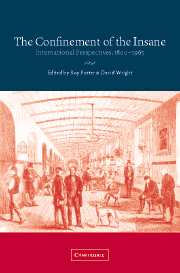Book contents
- Frontmatter
- Contents
- List of figures
- List of tables
- Notes on contributors
- Acknowledgements
- Introduction
- 1 Insanity, institutions and society: the case of the Robben Island Lunatic Asylum, 1846–1910
- 2 The confinement of the insane in Switzerland, 1900–1970: Cery (Vaud) and Bel-Air (Geneva) asylums
- 3 Family strategies and medical power: ‘voluntary’ committal in a Parisian asylum, 1876–1914
- 4 The confinement of the insane in Victorian Canada: the Hamilton and Toronto asylums, c. 1861–1891
- 5 Passage to the asylum: the role of the police in committals of the insane in Victoria, Australia, 1848–1900
- 6 The Wittenauer Heilstätten in Berlin: a case record study of psychiatric patients in Germany, 1919–1960
- 7 Curative asylum, custodial hospital: the South Carolina Lunatic Asylum and State Hospital, 1828–1920
- 8 The state, family, and the insane in Japan, 1900–1945
- 9 The limits of psychiatric reform in Argentina, 1890–1946
- 10 Becoming mad in revolutionary Mexico: mentally ill patients at the General Insane Asylum, Mexico, 1910–1930
- 11 Psychiatry and confinement in India
- 12 Confinement and colonialism in Nigeria
- 13 ‘Ireland's crowded madhouses’: the institutional confinement of the insane in nineteenth- and twentieth-century Ireland
- 14 The administration of insanity in England 1800 to 1870
- Index
Introduction
Published online by Cambridge University Press: 24 July 2009
- Frontmatter
- Contents
- List of figures
- List of tables
- Notes on contributors
- Acknowledgements
- Introduction
- 1 Insanity, institutions and society: the case of the Robben Island Lunatic Asylum, 1846–1910
- 2 The confinement of the insane in Switzerland, 1900–1970: Cery (Vaud) and Bel-Air (Geneva) asylums
- 3 Family strategies and medical power: ‘voluntary’ committal in a Parisian asylum, 1876–1914
- 4 The confinement of the insane in Victorian Canada: the Hamilton and Toronto asylums, c. 1861–1891
- 5 Passage to the asylum: the role of the police in committals of the insane in Victoria, Australia, 1848–1900
- 6 The Wittenauer Heilstätten in Berlin: a case record study of psychiatric patients in Germany, 1919–1960
- 7 Curative asylum, custodial hospital: the South Carolina Lunatic Asylum and State Hospital, 1828–1920
- 8 The state, family, and the insane in Japan, 1900–1945
- 9 The limits of psychiatric reform in Argentina, 1890–1946
- 10 Becoming mad in revolutionary Mexico: mentally ill patients at the General Insane Asylum, Mexico, 1910–1930
- 11 Psychiatry and confinement in India
- 12 Confinement and colonialism in Nigeria
- 13 ‘Ireland's crowded madhouses’: the institutional confinement of the insane in nineteenth- and twentieth-century Ireland
- 14 The administration of insanity in England 1800 to 1870
- Index
Summary
The closing decades of the twentieth century brought a rising and sustained critique of the welfare institutions of the modern state – one largely left-wing in origins but increasingly taken over and voiced by the radical right. Professions which professed to be ‘enabling’ were, claimed a rising chorus of critics, ‘disabling’. Social services which presented themselves as benign were, in reality, ‘insidious’, serving the interests of providers not consumers, promoting professional dominance, policing deviance and intensifying the social control required to ensure the smooth running of multinational capitalist corporations – or, in the right-wing version, such institutions were wasting tax-payers' money on scroungers and so encouraging malingering.
Unsurprisingly, such political critiques of ‘welfarism’ (in its widest sense) spawned histories of their own. Replacing various kinds of Fabian, ‘Whig’ or celebratory historical interpretations which had treated the emergence of the ‘caring professions’ and social-security institutions as beneficial and progressive – as shifts from neglect to administrative attention, from cruelty to care, and from ignorance to expertise – a new brand of studies took altogether a more negative or jaundiced view of such social institutions and policies, and sought to blow their benevolent ideological cover.
In no field were the new and critical histories more critical, indeed more indignantly impassioned, than the history of psychiatry. Traditional ‘in-house’ and Whig histories of the care of the insane had never been particularly triumphalist – after all, psychiatry had always been a house divided against itself, uneasy in its stance towards both the public and the medical profession at large, and aware of its embarrassing want of ‘magic bullets’.
- Type
- Chapter
- Information
- The Confinement of the InsaneInternational Perspectives, 1800–1965, pp. 1 - 19Publisher: Cambridge University PressPrint publication year: 2003
- 3
- Cited by



